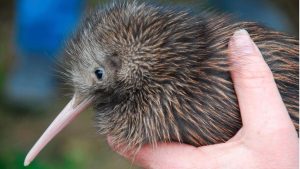The Kiwi bird is one of our most loved and treasured of birds. Known for its Maori link, it is a bird of individuality and uniqueness, and is native only to our wonderful shores.
 These small flightless birds are unfortunately becoming rarer to spot, and usually only the most talented and knowledgeable of bird watchers can locate them. Therefore, it makes sense that a few wildlife conservationists on the island are taking in these impressive birds to their sanctuary, enabling the breeding process to continue and ensuring that future generations get to see these wonderful little birds for many more years to come.
These small flightless birds are unfortunately becoming rarer to spot, and usually only the most talented and knowledgeable of bird watchers can locate them. Therefore, it makes sense that a few wildlife conservationists on the island are taking in these impressive birds to their sanctuary, enabling the breeding process to continue and ensuring that future generations get to see these wonderful little birds for many more years to come.
Ensuring the Future of The Kiwi Bird
One of the more successful of sanctuary’s, currently undertaking the challenge to protect our beloved Kiwi bird, is the Otorohanga Kiwi House & Native Bird Park. Since 1971, this sanctuary has been working on conserving the breed and have a successful breeding programme ensuring our little feathered friends will be around with us for the foreseeable future.
Visitors to this sanctuary can learn about the bird and get up close and personal, as they are regularly fed in front of visitors, allowing them to witness them first hand – something which is never possible in the wild.
Fun Kiwi Facts
If you have never seen a Kiwi bird before, you may find it slightly amusing. With a very long beak, on a very small bird, the most interesting fact about this bird is the location of its nostrils – at the very end of its beak! By having their nostrils at the end of the tip of their beak, Kiwi’s can locate their food much easier! This bird may have wings, but it can’t fly. Unfortunately, by not being able to fly, they are at greater risk from predators such as cats, dogs and stoats. Their initial survival instinct when threated is to scratch and kick out to try and run away from potential predators.
Though their brown feathers resemble hair strands and make them appear quite cute, and effective in camouflage, kiwi birds do smell quite badly – meaning their predators often get a whiff of them before spotting them! That said, these birds are often mistaken as shy and defenceless. However, if you were to approach one, you may well find them the more aggressive of the bird family! When they need to defend their territory, they will attack and never usually back down from a fight with other birds!
To see for yourself some of the amazing work the sanctuary does, check out their website at http://kiwihouse.org.nz/

سلام برای ارسال پیامک انبوه می تونید از سایت پیامک آموت استفاده کنید.